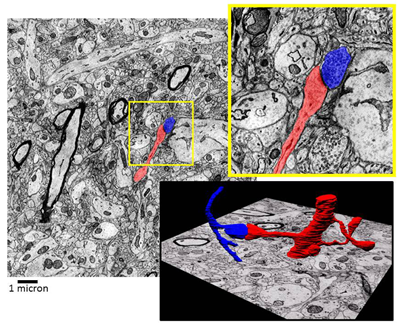Chemical brain preservation: how to live ‘forever’ — a personal view
September 16, 2012

Neuroscientists today can preserve small volumes (<1mm³) of animal brain tissue immediately after death with incredible precision — the features and structure of every synapse within these volumes is well-protected down to the nanometer scale, using an inexpensive, room-temperature process of chemical fixation and plastic embedding, or “plastination.” This image is an example of plastination and local circuit tracing, occurring in leading neuroscience labs around the world today. (Credit: Brain Preservation Foundation)
Here’s my 45 minute talk on Chemical Brain Preservation at World Future Society 2012. Given the progress we’ve seen in the relevant science and technologies it’s a topic I’m presently very optimistic about. I had a great audience with lots of questions at the end, but in the interest of brevity I’m just uploading the talk. Let me know your thoughts in the comments, thanks!
A number of neuroscientists, working today with simple model organisms, are investigating the hypothesis that chemical brain preservation may inexpensively preserve the organism’s memories and mental states after death. Chemically preserved brains can be stored at room temperature in cemeteries, contract storage, even private homes.
Our 501c3 nonprofit organization, the Brain Preservation Foundation, is offering a $100,000 prize to the first scientific team to demonstrate that the entire synaptic connectivity (“connectome”) of mammalian brains can be perfectly preserved using either chemical preservation or more expensive cryopreservation techniques.
Such preserved brains may be “read” in the future, analogous to the way a computer hard drive is read today, so that either memories or the complete identities of the preserved individuals can be restored or “uploaded” in computer form.
Chemical preservation techniques are already being used to scan and upload the connectomes of very small animal brains (C. elegans and OpenWorm, zebrafish, soon flies). Though these scans are not yet sufficiently complex to extract memories from the uploaded organisms, give them a little more time, we’re very close now to cracking long-term memory. We just need to know a bit more about this process at the protein/receptor/gene level: http://en.wikipedia.org/wiki/Long-term_potentiation
Amazingly, if information technologies continue to improve at historical rates, a person whose brain is chemically preserved in 2020 might have their memories read or even fully return to the world in a computer form not centuries but just a few decades from now, while their children and loved ones are still alive. Given progress in electron microscopy and connectomics research to date, we can even forsee how this may be done as a fully automated and inexpensive process.
Today, only 1% of people in developed societies are interested in living beyond their biological death (see When I’m 164, David Ewing Duncan, 2012). With chemical brain preservation, this 1% may soon have a validated, low-cost method that will allow them to do just that. Once it becomes a real option, and recovery of simple memories has been demonstrated in model organisms, this 1% may grow larger as well.
I am particularly excited by chemical brain preservation’s ability to improve the social contract: what benefits we may reasonably expect from the universe and society when we choose to live a good and moral life. I believe that having the option of chemical brain preservation at death, if the science is validated, may help all our societies become significantly more science-, future-, progress-, preservation-, sustainability-, truth and justice-, and community-oriented in coming years.
Would you choose chemical brain preservation at death if it was widely available, validated, and inexpensive? If not, why not? Would you do it to donate your brain to science? Your memories to your children or others who might want them? Would you be willing to come back in person, if that turns out to be possible? If it is sufficiently inexpensive, would it be best to preserve your brain at death, and let future society decide if either your memories or your identity are “worth” reanimating?
Please let me know what you think in the comments, thank you.
